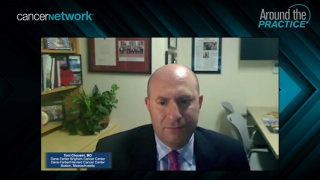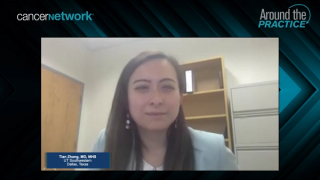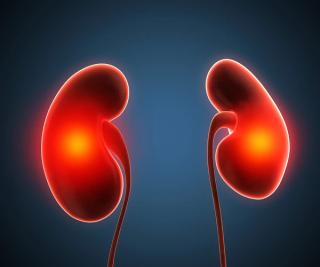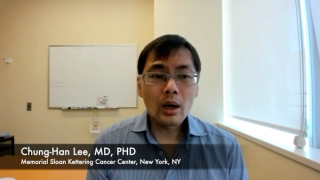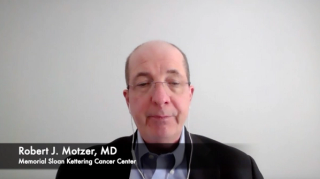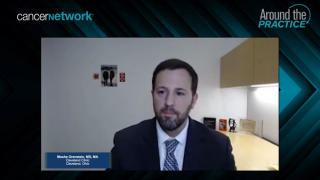
Kidney Cancer
Latest News
Latest Videos

CME Content
More News

Reduced expression of PBRM1 and VHL was correlated with increased tumor aggressiveness in clear cell renal cell carcinoma, according to the results of a recent study.

The FDA has expanded the label for cabozantinib (Cabometyx) to include first-line treatment of advanced renal cell carcinoma regardless of treatment status. Cabozantinib was initially approved in patients who had previously received anti-angiogenic therapy.

This article provides a practical perspective on the management of advanced RCC, as well as insight into the current models of risk stratification and ongoing clinical trials. The discussion will focus on the currently available systemic therapies; other strategies that are beyond the scope of this article include active surveillance and metastasectomy.

A new study demonstrates a relationship between radiographic tumor burden and the detection of circulating tumor DNA in patients with metastatic renal cell carcinoma.

Data presented at the 16th International Kidney Cancer Symposium showed that TP53 and VHL genes could act as predictive biomarkers for VEGF-targeted therapy for RCC.

Treatment with crizotinib resulted in objective responses in patients with advanced papillary renal cell carcinoma type 1 with MET mutations or amplification.

The gut microbiome affects the efficacy of PD-1 immune checkpoint blockade immunotherapy against melanoma and other cancers, according to a pair of recent studies.

The FDA has approved a new indication for sunitinib (Sutent) to include the adjuvant treatment of renal cell carcinoma in patients at high risk of disease recurrence following nephrectomy.

Researchers have discovered that androgen signaling can either stimulate or suppress tumor cell movement and invasion to different locations in the body in patients who have renal cell carcinoma.

Data from three independent cohorts suggest that high EZH2 expression may mean a higher risk of death for patients with clear cell renal cell carcinoma.

A large proportion of patients who underwent radical nephrectomy for kidney tumors were able to recover to their preoperative renal function, according to the results of a recent study.

Combination treatment with a novel CXCR4 inhibitor and axitinib resulted in an encouraging overall response rate and disease control rate in patients with clear cell renal cell carcinoma, according to the results from phase I of a phase I/II trial.

Boosting NK cell infiltration into RCC tumors appears to be an attractive therapeutic option for improving the success of NK cell–based therapies and improving clinical response.

A discovery of novel biomarkers for renal cell carcinoma may lead to a diagnostic blood test that could mean earlier detection of the disease and improved patient outcomes.

Cabozantinib reduced the risk for disease progression or death by 52% compared with sunitinib in patients with previously untreated advanced renal cell carcinoma, according to updated results from the CABOSUN trial.

This video highlights potentially practice-changing studies on genitourinary cancers presented at the 2017 ASTRO Annual Meeting.

Treatment with pazopanib 600 mg had no benefit over placebo for patients who had undergone nephrectomy for localized or locally advanced renal cell carcinoma.

The FDA has approved the first cancer therapy biosimilar in the United States, a biosimilar to Avastin (bevacizumab) for the treatment of multiple types of cancer, including colorectal, lung, brain, kidney, and cervical cancers.

TRC105, a monoclonal antibody against endoglin, failed to improve progression-free survival when added to bevacizumab compared with bevacizumab alone in patients with refractory metastatic renal cell carcinoma.

More than half of patients with metastatic clear cell renal cell carcinoma treated with a combination of lenvatinib and pembrolizumab responded to treatment at week 24, according to interim results of a phase I/II study presented at the 2017 ESMO Congress.

African American patients with localized renal cell carcinoma who underwent robotic partial nephrectomy were at an increased risk for positive surgical margins compared with white patients.

This video reviews the various treatment options for metastatic renal cell carcinoma in the second-line setting, including considerations for different toxicity profiles.

This video reviews the first-line treatment of metastatic renal cell carcinoma, including for those patients who are ineligible for interleukin-2.

Patients with metastatic renal cell carcinoma had durable responses and manageable safety when treated with the combination of nivolumab and ipilimumab.

A phase II study has shown that savolitinib is active in a subgroup of patients with papillary renal cell carcinoma with gene amplification or mutations in the MET pathway.

